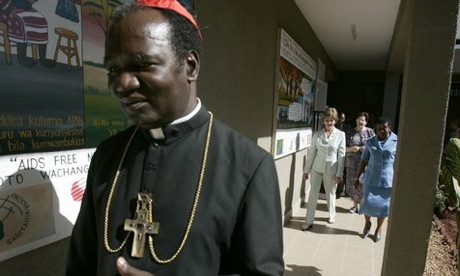In a pastoral letter strongly denouncing the “cancer” of corruption and the “plunder” of natural resources, the Catholic bishops of Africa have urged national leaders to promote good governance and democratic transitions.
The letter was issued by the Symposium of Catholic Bishops’ Conferences in Africa and Madagascar (SECAM). It was signed by SECAM’S president Cardinal Polycarp Pengo, Archbishop of Dar-es-Salaam.
The letter, addressed to “all people of good will”, said the Church is attentive to everything that affects the day-to-day political, economic and social lives of her people.
During the democratic transitional period of the 1990s, the Church played a clearly visible role, the letter said. Five out of the eight national transitional conferences that were organised during this epoch were chaired by Catholic bishops.
Fifty years after independence, many African economies remain weak, the bishops said.
“Africa remains a prey of foreign multinational companies. They continue to plunder the continent of its resources; in some cases they even evade the tax system both in African countries and in their own countries of origin by putting away the revenues of their activities in fiscal havens, thus depriving local communities of resources they are entitled to….
“The development of our countries is strongly mortgaged by corruption. Corruption has become a cancer in almost all the African countries and affects vital sectors such as the economic system, day to day administration, the job market, health, education, and the judicial system.
“We are aware that many governments are conscious of this problem and are making efforts to combat it. Unfortunately, personal interest and the frantic quest for gains have become stronger than the sense of the common good.”
Among their suggestions, the bishops said: “Perhaps time has now come for Africa to strive to invent models of government that really respond to our needs and fit our contexts, inspired by the wisdom of African traditional governance systems and structures.”
Sources:
Fides (Text of pastoral letter)
Image: The White House
